When Tom Cruise was sent the script for his upcoming epic, “The Last Samurai,’ all he knew about Japan’s ancient warriors came from watching Akira Kurosawa movies and, later, their Jedi cousins in George Lucas’ “Star Wars’ series. As a young man, Cruise thought samurai were cool, what with the swords and the flowing garb, but now, as he started reading up, he discovered their Meshido code of honor. Today, he can’t stop talking about it.
“Honor, loyalty, compassion: Those aren’t just words, they are action, they are a way of life,’ Cruise says. “This movie has a lot of adventure and battle scenes, but I wouldn’t have made it if it didn’t explore the samurai’s code. The purity of that is stronger than any battle scene we could have dreamt up.’
As Cruise says this, he and “Samurai’ director Ed Zwick are flying in a private jet somewhere over the Pacific Ocean. They’re returning from a whirlwind trip to Japan, and we do mean whirlwind. They were on the ground for less than 12 hours, in the air for more than 24. But this code thing has proved to be a hard habit to shake, and Zwick promised Japanese officials that they’d be the first to see clips from the movie, which will be released in the States on Dec. 5.
“It’s their culture, and I think they were a little reticent at first about us making a movie depicting it,’ Cruise, 41, says. “Now I get the feeling that they’re excited. We’ll see. In Japan, young people today don’t really know what Meshido is or the code of the samurai. I don’t know how much of a history lesson this is, but at least it will be out there for them to absorb.’
Indeed. Cruise’s movies don’t usually want for exposure, although this year he’s going to have to fight for the attention of moviegoers. “The Last Samurai’ is a historical epic in a holiday season crowded with period yarns: Peter Weir’s “Master and Commander’ sails the high seas, John Lee Hancock remembers “The Alamo,’ and Anthony Minghella’s Civil War love story “Cold Mountain’ will have the Miramax marketing might behind it. Each one is a potential box-office blockbuster and best-picture contender.
Like “Cold Mountain,’ “The Last Samurai’ is set in the Civil War period. Cruise plays Nathan Algren, a tortured Union officer, a former war hero turned drunk, haunted day and night by the massacre of a Sioux tribe. Algren comes to Japan in 1876 when the Japanese emperor decides to modernize his army and teach them Western warfare. That spells the end for the samurai.
Algren is, at first, the good soldier. But the more time he spends trying to eradicate the samurai, the more he comes to appreciate their ways. Events conspire to bring Algren’s conflicted loyalties to a head, and from that point, the man puts his money where his Meshido is.
Zwick has wanted to make a samurai movie ever since, well, forever. He first saw Kurosawa’s movies while a freshman at Harvard. He remembers when he saw each one and where, and counts the moment when he shook the master’s hand at a reception for “Kagemusha’ in 1980 as one of the greatest in his then-young life.
But wanting to make a samurai movie and getting a studio to green light it are two different things, even for a director like Zwick, who has proven himself commercially both with movies he has directed (“Glory,’ “Legends of the Fall’) and produced (“Traffic,’ “Shakespeare in Love’).
“When you go to somebody and say, ‘I want to make a movie about the Meiji Restoration of 1878,’ generally it’s a kind of dull, blank stare that you get,” Zwick says. “You have to show them what you mean, talk about the dramatic changes in the social structure and the internal revolutions Japan was facing, then you have to deliver it all on the page and then you fight about money — a lot.’
That’s one reason why it’s taken Zwick the better part of a decade to put “The Last Samurai’ on the screen. Not surprisingly, when Cruise signed on board last year after dropping out of “Cold Mountain’ (different movies, different time zones, same time period), Warner Bros. president Alan Horn was happy to give Zwick all the money he needed (which was a lot) to realize his vision.
To play the Yankee-turned-samurai, Cruise did all the requisite training so he could perform the heavy lifting the film required. He pitched a tent on a tennis court at his house seven months before filming began, enlisted Nick Powell — who taught Russell Crowe and Mel Gibson their savage sword moves for “Gladiator’ and “Braveheart,’ respectively — and went to work. Cruise gained 20 pounds — most of it went to building muscle in his thighs, forearms and shoulders — to be able to comfortably wear the samurai armor and wield all the weaponry.
“I knew something was working when I tried putting on one of my suits and couldn’t get my arm in the sleeve,’ Cruise says, laughing. “Carrying those swords just builds up your forearms beyond belief.’
But he’s quick to add that samurai aren’t all about fighting, and again goes back to the code — the loyalty, honor and compassion that the ancient warriors possessed. And as much as people focus on Cruise’s physical transformation — he grew out his hair and did his best to patch together a beard (he jokes those two things alone accounted for five pounds of his weight gain) — Cruise says the emotional work he devoted to his character was far more strenuous and time-consuming.
Marshall Herskovitz, Zwick’s long-time writing and producing partner, backs him up. Herskovitz was a producer on “The Last Samurai’ and took a pass at the screenplay last spring after Zwick basically told him to put up or shut up.
Herskovitz believed the movie needed to deepen the relationships between Cruise’s soldier and the film’s other characters. He wanted more emotional involvement all the way around. His question: Would Cruise want those same things?
“There’s always a certain amount of trepidation when you’re dealing with someone of Tom’s power,’ Herskovitz says. “They want what they want, and if they want something that you don’t want, it’s going to be a difficult situation. And usually what they want comes from some combination of vanity and fear. They want to protect themselves.
“But what I got with Tom is: ‘I want to be challenged. I want to do something I’ve never done before and I think this is the way to do it.’ And then he offers these remarkable insights about what makes a character work, things we had never thought of, things that were no less bold from an acting standpoint.
“I think what has happened,’ Herskovitz continues, “is that, over the years, Tom has put himself in the hands of people he considers to be masters of the form, whether it’s Scorsese or Kubrick, and has quite openly wanted to learn from them. And what’s interesting is to see him now coming into his own as a man — he’s 40 years old (actually 41) — having internalized a lot of this stuff, having a vision that’s informed by a lot of what these guys taught him. And it’s very sophisticated.’
Cruise won’t cop to that, although, like the samurai, actions speak louder than words. He’s moving from “The Last Samurai’ to playing a contract killer in Michael Mann’s new movie, “Collateral,’ another left turn for another great director.
“You want to do something that’s exciting, and excitement usually comes with risk,’ Cruise says. “But that’s half the fun of it, I think.’
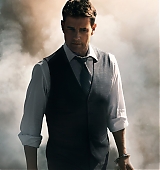
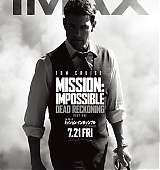
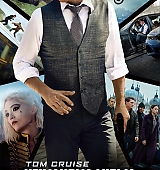
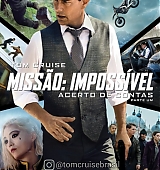
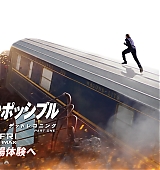
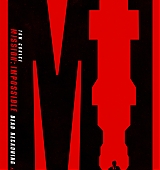
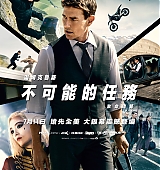
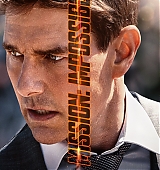
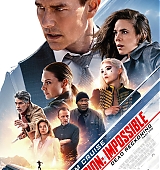






















Comments are closed.